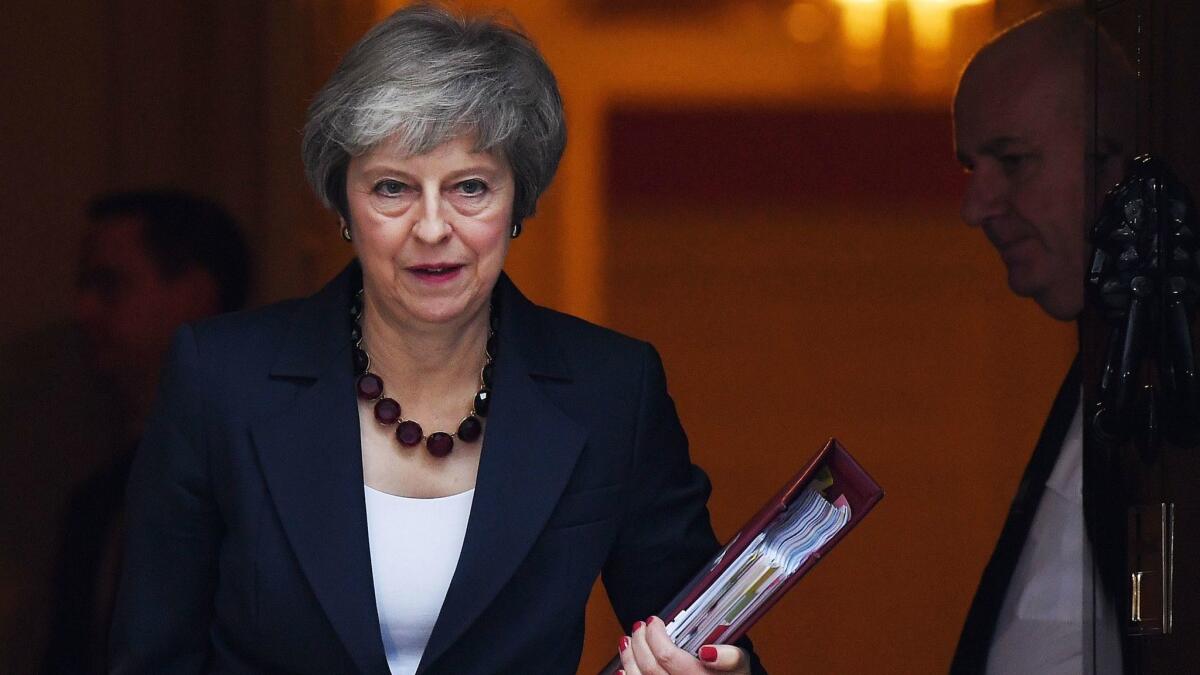‘Brexit’ withdrawal deal: Theresa May gets Cabinet approval for her draft agreement

After a five-hour meeting with her Cabinet ministers, and months of struggle and delay, Prime Minister Theresa May emerged from 10 Downing Street and announced that her ministers had given a unanimous nod of approval to her “Brexit” withdrawal plan.
Approval of the draft agreement, negotiated by British and European Union officials, marks a major step toward finalizing a divorce. But the plan still requires endorsement by European heads of state and the British Parliament before Brexit happens at the end of March.
It marked the end of a remarkable day in British politics - a true cliffhanger, with social media and the airwaves filled with speculation about whether May’s deal would survive the day.
At noon, May was in Parliament, where she heard the roar of her own backbench, as fellow Conservative Party members heaped derision on a deal they had not yet seen - but that they feared contained too much compromise.
Conservative member of Parliament Peter Bone warned May that she was “not delivering the Brexit people voted for.” He said, “Today you will lose the support of many Conservative MPs and millions of voters across the country.”
Arch-Brexiteer Boris Johnson, who quit his job as foreign secretary over May’s proposals in July, urged Cabinet members to “live up to their responsibilities and reject it.”
“It’s vassal-state stuff,” Johnson said earlier. “For the first time in 1,000 years, this place, this Parliament, will not have a say over the laws that govern this country.”
A Conservative member of Parliament who opposes Brexit, Anna Soubry, said Wednesday that British voters should be offered another chance to cast a ballot on whether to support May’s deal or remain in the European Union.
“What I think is very important in all of this is, the best deal, of course, that we have with the European Union, is the deal that we currently have with the European Union,” Soubry told the BBC.
Sammy Wilson, a Parliament member for Northern Ireland’s Democratic Unionist Party (DUP), which May needs to prop up her minority government, told TalkRadio that May’s plan “is not so much a deal as a double-cross.”
The DUP’s chief whip at Westminster, Jeffrey Donaldson, said, “This is not the right Brexit.”
He said May’s half-in, half-out plan “doesn’t give the United Kingdom as a whole the opportunity to do free-trade deals and to take control of its own future.”
Outside Parliament, Nigel Farage -- top Brexit campaigner and a member of the European Parliament, called May’s withdrawal agreement “the worst deal in history.”
What would happen at the Cabinet meeting was unknown -- although May’s supporters said the prime minister would not be presenting the draft deal if she did not think she could muscle it through.
“Did anybody really think you could leave the EU without a lot of compromises?” said former Conservative Party leader William Hague.
He told the BBC on Wednesday that the reported Brexit deal fulfills the mandate the British voters chose when they voted 52% to 48% in a June 2016 referendum to leave the European bloc.
“If what you want is to deliver on leaving the European Union, and have frictionless trade in goods at the border for the next few years until a future free trade agreement comes into force, and have control of our own immigration policy, and keep the United Kingdom together, all at the same time -- well, then, a deal is going to look pretty much like this one seems to look like. It isn’t going to be dramatically different from that,” Hague said.
The next step will be a Brexit summit attended by leaders of the EU’s remaining 27 member states at the union’s Brussels headquarters later this month, with Nov. 24 and 25 penciled in as possible dates.
Following approval by the European leaders, the treaty would go to the British Parliament, where it would face an uncertain fate.
Whatever happens, this deal is just the first stage of the lengthy process of ratifying Britain’s withdrawal from the EU. To follow are negotiations over Britain’s future trade, security and economic relations with Europe -- including side deals about immigration levels.
For the past two years, the greatest debate over Brexit has not been waged between Brussels and London, but within May’s fractious Conservative Party, composed of “leavers” and “remainers.”
Hard-line Brexiteers have pushed for a decisive split from European bureaucrats and courts, from EU rules and regulations, while others, led by May, have sought a softer Brexit, a bundle of compromises that keep Britain more closely aligned with Europe, to better protect the British economy.
Supporters of a hard Brexit have said May’s plan would leave Britain “a rule taker” versus “a rulemaker,” subject to following Brussels laws for trade, without having much say in how they are written.
How to avoid the return to a hard border between Northern Ireland, which is part of the United Kingdom, and the Republic of Ireland, a member of the EU, has been one of the toughest issues facing the negotiators.
The Europeans have insisted that in the case that a future free-trade deal is not secured, Northern Ireland should remain in the European customs union. May has said that is not acceptable because it undercuts British sovereignty.
May has previously said that the choice is between her withdrawal deal or no deal at all, which many think would trigger severe economic disruption. But some of her critics said there were more options to explore.
The leader of the Scottish National Party, Nicola Sturgeon, tweeted on Tuesday: “If the PM’s ‘deal’ satisfies no one and can’t command a majority, we mustn’t fall for her spin that the UK crashing out of EU without a deal is then inevitable - instead we should take the opportunity to get better options back on the table.”
Most lawmakers in the opposition Labour Party are expected to vote against the plan if and when it reaches Parliament. Labour leader Jeremy Corbyn said: “We will look at the details of what has been agreed when they are available. But from what we know of the shambolic handling of these negotiations, this is unlikely to be a good deal for the country.”
UPDATES:
12:10 p.m.: This article was updated with details on Cabinet approval.
This article was originally published at 6:50 a.m.
More to Read
Sign up for Essential California
The most important California stories and recommendations in your inbox every morning.
You may occasionally receive promotional content from the Los Angeles Times.










